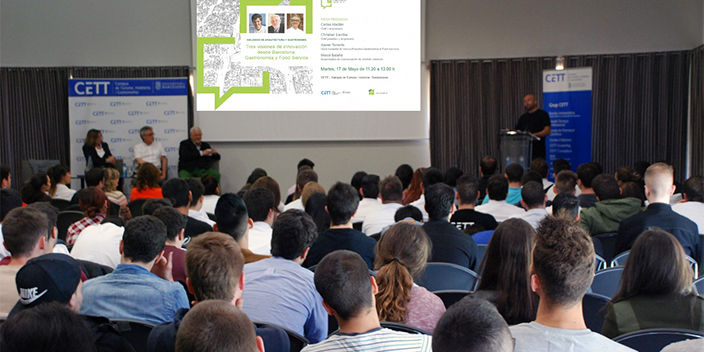The observation, the constant transformation of spaces of restoration and to understand the needs of the city, keys to success for new projects and dining areas
How to be innovative and where to focus efforts to provide a differentiation in order to give value to the new projects was the reason for the conference organized by the Institute Silestone and CETT, in the framework of the session “Dialogues of Architecture and Gastronomy”, that promote the knowledge of the kitchen space. The participants in the round table were Christian Escribà, Master Pastry Chef and entrepreneur, Jordi Parra Chef and Carles Abellán team´s Technical Director, Xavier Torrents founder of Innova Consulting and gastronomic coach and Mercè Balañá, Communication Manager of Silestone Institute.
The meeting brought about 150 students from CETT, School of Tourism, Hospitality and Gastronomy affiliated to the University of Barcelona. The starting point of the session, introduced by Mercè Balañá, was the idea of the physical space and how last generation materials like Dekton and Silestone not only fulfill requirements in the area of food security and durability but also provide esthetic kitchen designs.
The speakers highlighted how innovation in the catering sector covers a multitude of aspects, which include the spaces but also services, the processes, branding, the speed, the notoriety, or the specialization, among others. However, Xavier Torrents emphasized that the observation “is the basis of everything”, then answers will come up and lead us to the differentiation, to the reputation and, therefore, “we will be able to transform the products that we offer into experiences”.
Christian Escribà outlined his concern about the constantly transformation of the space in order to adapt it to the needs of each moment and provide the client reasons to catch the attention and interest in their creations. He rather plays with the show windows, not necessarily exhibiting product, which become relevant as a decorative element and focal point of attraction in the interior of the store.
Jordi Parra focused on the proximity to the public and how to identify the needs of the environment to generate new projects. Either with haute “tapas” cuisine, the innovative concept of “chiringuito” (beach bar) or the new restaurant Bar by Carles Abellán, at the seaside neighborhood of Barceloneta, the key is to adapt each proposal to each customer.
